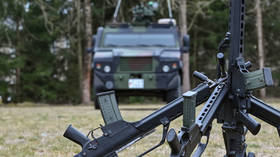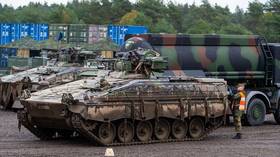Germany to spend billions on weapons for Ukraine – media

German Chancellor Olaf Scholz has announced plans to spend an additional €2 billion ($2.16 billion) on military needs, most of which is aimed at providing supplies to Ukraine, Reuters reported on Friday.
Citing a government source, the news agency said that approximately €400 million ($432.5 million) of the cash is being allocated to the European Peace Facility, a funding mechanism through which military aid is being procured for Ukraine. The remaining part of the additional funds will be deployed directly towards supplies for Kiev, among other needs.
The decision of the German authorities to send weapons to Ukraine, which was announced two days after Moscow’s launch of its military operation, marked a major shift in Berlin’s policy of not providing Kiev with lethal weapons.
Soon thereafter, Scholz announced a plan to beef up the German military, which has been plagued by equipment shortages for years. He pledged €100 billion ($112.7 billion) of the 2022 budget for the armed forces and committed to reaching the target of 2% of GDP spending on defense that is requested by NATO. However, later on the chancellor took a rather cautious approach when it came to the conflict in Ukraine.
Earlier this week, Scholz said that Germany would continue military supplies to Kiev but would send only “correct and reasonable” weapons and only in close coordination with its partners. Berlin also made it clear that it was not planning to send “offensive” weapons, such as tanks and other armored vehicles, despite Ukraine’s numerous requests.
Such a policy, along with the government's reluctance to support the plans for an EU ban on Russian oil and gas, has prompted criticism from the Green Party, which controls the foreign and economy ministries. On Monday, Foreign Minister Annalena Baerbock urged the West to provide Kiev with heavy weaponry and appeared to criticize Scholz, stressing that “now is not the time for excuses.”
A senior Green MP, Anton Hofreiter, called the chancellor’s approach “damaging” not only to Ukraine but also to Germany’s reputation in Europe and in the world.
Many of his compatriots seem to agree. According to a recent poll conducted by the outlets ARD and Welt, 55% of Germans support supplying heavy weapons to Ukraine, while 37% do not back such an idea.
Initially, Berlin provided Ukraine with 1,000 anti-tank weapons and 500 anti-aircraft Stinger missiles. In mid-March, Germany said that due to security risks it would not disclose further information about supplies of weapons to Ukraine
Russia attacked its neighbor in late February, following Ukraine’s failure to implement the terms of the Minsk Agreements, first signed in 2014, and Moscow’s eventual recognition of the Donbass republics of Donetsk and Lugansk. The German- and French-brokered protocols were designed to give the breakaway regions special status within the Ukrainian state.
The Kremlin has since demanded that Ukraine officially declare itself a neutral country that will never join the US-led NATO military bloc. Kiev insists the Russian offensive was completely unprovoked and has denied claims it was planning to retake the two republics by force.














